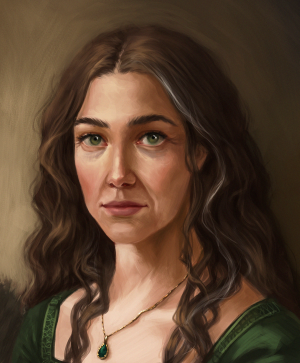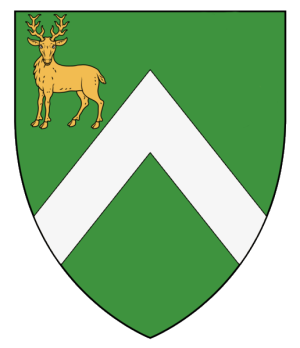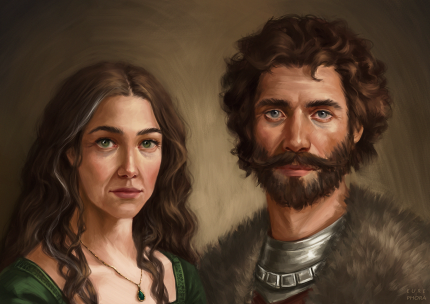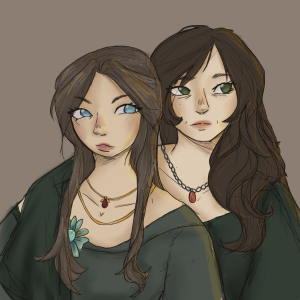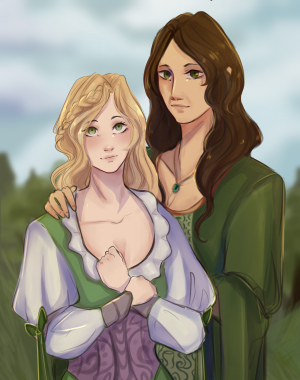Clarissa Reinhardt
|
|
| Title(s) | Herzogin, Lady Steward |
| Born | 1491 AFS |
| Spouse | Herzog Janczyk-Mariusz Tzyrnowski |
| Issue(s) | |
| Realm(s) | The Hadrian Empire |
| Race | Attian Human |
| Culture | Hadrian |
Physical description:
Clarissa Reinhardt is 60 years old and is about 173cm (5'7). She has bright green eyes, and long, wavy brown hair. She often wears nice dresses, as a woman of low nobility. Sometimes she may wear a cloak over her dress - to keep her warm.
Characteristics:
Clarissa presents herself as neutral, showing little emotion in public, however; when given the chance, she enjoys telling jokes and has a witty sense of humor. She is deeply interested in the Empire’s politics and wishes to be able to help the people, as well as the Empire. However, she is aware of her family’s past and wishes to earn and maintain respect for herself and her family. One lesser-known feature of her is that she loves playing with cats in her garden.
History:
Early Life
Clarissa Reinhardt was born on Thunderday the 20th of Sunfall, Eden’s Shrine of 1491, as a young noble girl of House Reinhardt. She had one older brother, Elric, whom she loved dearly and spent a lot of time with as a younger child. They particularly loved playing with horses and singing songs together.
Growing up in a Noble family
Clarissa’s and Elric’s father was Hugo Reinhardt, brother of Marcus Reinhardt. Her mother was Marion Reinhardt, whom she greatly loved. She spent much time with her family when she was younger, often playing games, and cooking with her mother. However, this didn’t last long, and her mother made sure she was educated, often reading to her. Her father became more distant throughout her childhood, instead focusing on helping her brother grow up, and frequently ignoring her and her mother. This made young Clarissa upset, and she found comfort in a cat that was always around their household. His name was Roger, or ‘Roggy’, as she’d call him, and she loved stroking his fluffy black and white fur.
Clarissa was homeschooled by her mother, as her parents preferred her to be closer to home. Her mother taught her the vital skills of reading and writing, and then often made up stories to aid her learning. They also spent a lot of time studying Makerism, which her mother believed was very important. House Reinhardt had a resident clergyman, whom Clarissa was close with, and who taught her the guidelines of the Maker’s traits -The Nine Wisdoms.
Outside of her learning, as a young noble girl, Clarissa learned how to tend to horses, and horse riding, which she greatly enjoyed. She found them particularly calming, and perhaps an opportunity to go wherever she liked. Inside, she loved to sing and play music, which helped her regulate her emotions, particularly during times when her father would not pay attention to her. When Clarissa became older, she became more distant from her brother and father but still loved them.
She found great joy in the company of another young House Rosenstrauch noble, Adrian. They spent a lot of time playing and singing together. Frequently, they could be found wandering in the flower fields near Clarissa’s house. She believed him to be a kind boy, slightly arrogant but gentle and loving. Her brother did not like Adrian very much and continually scowled at him. Nevertheless, Clarissa enjoyed her time with him.
The Age of the Rotten Plague
In 1506, the Rotten Plague hit the Kingdom. Her father refused to help the citizens of the Kingdom as he was supposed to do, just like her uncle did. Clarissa was still young then, at 10 years old, and did not know what this meant particularly. She was just glad to be able to be safe with her family. However, when she heard that Adrian had been infected and died from the plague, she cried and demanded her father let her out to help those in need. She could not bear to let others lose the people they loved. Her father said no, locked the front doors, and barred the windows to prevent her from getting out of the house. Throughout this, her mother continued to educate her and her brother, believing that they would outlast the dreadful disease.
Soon after, Clarissa heard that King Wilhelm von Leichenfelts had contracted the plague. She, like many others, believed that this was the Makers' punishment for him abandoning his people to their deaths.
Once the Civil War broke out, House Reinhardt had troubling political differences. Her father and uncle differed in who they would serve, House Withmond or The Royal House Lichtenfelts. Her father was loyal to the Royals, as he had served the longest with them. However, her uncle believed that a new dynasty was coming, and chose to serve House Withmond instead. Like her father, Clarissa believed that the Royals were the right house to serve.
This caused a dramatic split between the family, and House Reinhardt fought not only the Royalists but mostly their people. Clarissa witnessed her cousins, uncles, and family kill each other. She often saw her cousin Cedric come home wounded, and once or twice helped him patch up his injuries. She was secretly worried that he, too, would end up dead during the chaos, but never voiced this to him. However, this misfortune came to her brother, instead. Attempting to be brave, he had gotten himself involved in the fighting and was dramatically caught in the bloodshed, and killed while trying to prevent one of her cousins from killing another.
While she and her mother were out collecting flowers to lay by her brother, a man came running towards them with an axe, with a look of hate in his eyes. He took his axe, aimed it at her mother, and in two blows she was dead. It was a horrific sight for young Clarissa, and she began to run, terrified, and could hear the man behind her. However, it seemed he had been involved in fighting before her mother’s murder and was weakened and Clarissa managed to outrun him, partly due to her love for the outdoors. She realized her mother had been murdered due to her association with her father, and never forgave him for this.
Near the end of the civil war, her father heard that the Lord’s Alliance was going to try to storm the castle and end the war. Her father disapproved of this and took his forces to attack her uncle. Clarissa was barred from going, however, she snuck out and watched her family fight each other from a hilltop afar. In the end, she saw her father and uncle battling to the death, resulting in her father killing her uncle. Out of the confusion, she spotted her infuriated cousin Cedric running toward his father’s body. She saw how angry he was, and witnessed him beating her father to death in revenge. She fled from the hill and returned home swiftly.
She realized that out of the entire Reinhardt family, very few survived and were scattered around the Kingdom. She became envious of the fact that her cousin still had his sibling, and she didn’t. She also hated him for what he had done to her father. This atrocious event caused a change in Clarissa’s personality, causing her to be confused about the concept of family, as she had seen so much bloodshed. She began to trust less and keep herself on guard constantly. She saw how little family meant when it came to conflicts, and out of anger, she fled and stayed hidden outside of the Kingdom of Hadriana, referring to herself as Rodina Einar.
Growing up away from her home, and her journey back
Through a merchant, in the winter of 1515, she heard that her cousin Cedric had been declared a Heretic by the Church and law. His titles had been denounced, and he had been cast away into the dungeons of Hadriana’s Castle. When she learned of this, she fled further from the Kingdom to the North, where she survived by doing farmwork for an old man. At this time, she was glad Cedric had been imprisoned, as she saw it as a rightful punishment for what he had done to her father. However, after harbouring her identity for so long, she told the old man everything, encouraged by his solitude and trust. He was kind and assured her that no harm would come to her. He told her that forgiveness was vital and that in the situation she was in, there were no ideal choices. Over time, through talking, he encouraged her to forgive her cousin and to move forward. She never left the farm, for fear of being branded as a Heretic too, or being related to one. In a way, also, the farm was the only stable home she had.
However, years later, she heard of her cousins’ turn in fortune, when Cedric was appointed Ser, a knight of the Imperium. Despite this news, Clarissa wished to stay with the old man and help him, but he encouraged her to seek out her only remaining family member the Reinhardt Household. Consequently, she began to make her journey back to the Newfounded Hadrian Empire, believing it to be safer for her now. Although she questioned if it was wise of her to return to her cousin after abandoning him and resenting him for so long, she kept going on her journey. When she finally reached the Hadrian Empire, under the guise of her persona Rodina Einar, she asked where Ser Cedric Reinhardt lived and ended up travelling to Norbüren, to knock on his door.
Regaining her family and lands
Upon returning to her family home, she was greeted with open arms by her cousin Ser Cedric Reinhardt. He was initially taken aback by the thought that she might still be alive, as he believed his family to have been murdered. He did, however, greatly appreciate having a living kin.
For years, Clarissa supported him in his role as Herzog of Norbüren. As well as this, due to her dedication to the Empire, she was bestowed with the title of "Lady Steward" after just a year, which had previously belonged to her cousin. During one of her diplomatic visits to the former Republic of Raevendrecht, she got to know Janczyk-Mariusz Tzyrnowski, a young man who aspired to regain his title. She spent two years courting this man before eventually getting married to him.
In 1521, the first set of Clarissa's twins, two daughters named Anastazja and Cecylia, were born. Merely a year later, she gave birth to two sons, Bartosz and Cedryk, whom she named after her deceased cousin. She traveled back and forth between her husband's territory of Lünburg and her home in Norbüren. However, once her cousin Cedric passed away in 1531, she left Norbüren and returned to Lünburg to be with him.
After the Hadrian-Raevendrechter war in 1532, in an attempt to seize power, several war cabinet officials planned to kill the Kaiser and his son. They believed that a large number of the current nobility would bow down and recognise their leader as ruler. However, Clarissa and Janczyk would not stand for regicide and declared a civil war, plunging Hadriana into strife as it already was at war with Raevendrecht.
The conspirators eventually lost the will to carry on as a result of the exhaustion of the struggle and vanished. As the late Kaiser was slain in the coup, his brother, Diederick Göbel von Lichtenfelts sought refuge with the family, holding the intention of retaking the throne. Since Clarissa's family saw themselves as loyalists, they welcomed him with open arms.
This action was well met when the new Kaiser granted them Clarissa’s ancestral home in Norbüren, which is now known as the Duchy of Hertzland.
Trivia
- Clarissa loves singing and reading, and can often be found practicing with her instruments; the harp and the flute.
- Though she does not show much emotion, once a trusting relationship has been built, she laughs easily and enjoys jokes.
- She often wears a green dress, to remind her of her mother’s favourite colour.
- The wolf in her family crest stands for the Beast of Hadriana and the Blackwood Forest. A story that their family was involved in. This has now been turned into a folktale.
- Though she does not say, she believes that her daughter Cecylia bears a striking emotional resemblance to her mother.

